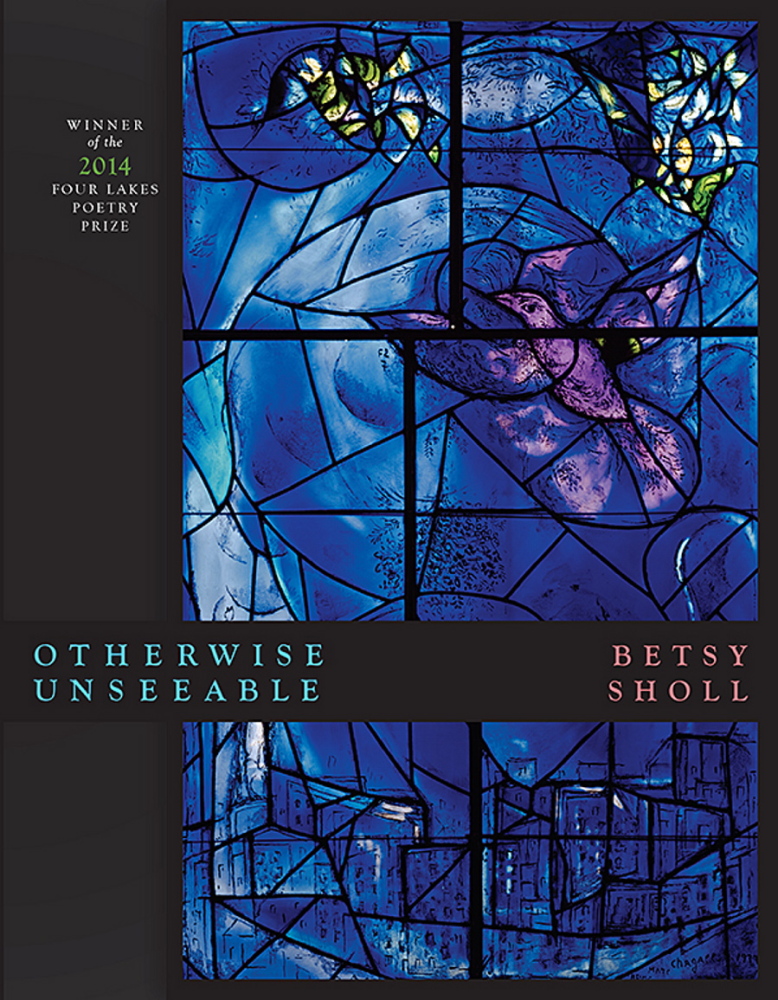“Otherwise Unseeable”
By Betsy Sholl
University of Wisconsin Press, Madison, Wis., 2014
90 pages, paperback, $16.95
Betsy Sholl, of Portland, has for years been one of Maine’s most well-known poets, serving as the state’s poet laureate from 2006 to 2011 and turning out meticulously crafted poems, placing them in high-profile literary publications, and bundling them into award-winning collections. Her latest book, “Otherwise Unseeable,” is another award-winner, taking the 2014 Four Lakes Poetry Prize sponsored by the University of Wisconsin department of English.
Sholl’s poetry is characterized by a sort of matrix of complexities that are all pointing in roughly the same direction — which I will disclose, in my understanding of it, a bit farther down. The principal explicit themes of “Otherwise Unseeable” involve memory and family, imagery and experience of the natural world, the complicated relationship your inner life has with history and politics, the fade and loss of life, and music.
This is a lot to talk about in a few hundred words of a newspaper review. But maybe the central focus of these poems, in one way of looking at them, is the music, because it appears in a variety of ways. For one thing, poems whose explicit subject matter is music appear more or less throughout the book. In the first of its three sections, for examples, are the poems “Poco a Poco” and “Tidal” (both turning on what learning to play the piano sounds like); “Rahsaan” (“‘You want to hear sun vibes, / wind in B-flat? Well, shut your damn eyes'”); and “Bird Lives” (on odd incarnations of the legendary jazz saxophonist). In the last section are “Bass Flute,” “The Aging Singer” and several others particularly involving jazz.
For another thing, an unusual emphasis is placed on the music of the words themselves — known in some lexicons as melopoeia. Line for line, alliterations, assonances, occasional rhymes and rhythms in Sholl’s poems produce persistent, often playful effects on your ear. The sister practicing piano in “Tidal” is “unraveling Ravel,” and “Russian Bells,” recounting how Soviet law in 1930 made the ringing of bells illegal, ends:
… almost
inaudible bones, heaps, half-bones wait
for earth to be unearthed, tongues loosened,
the ringing restored – in town after town,
that cloud-battering bronze, air unbound,
as the bells toll, they tell, each knell.
If you listen carefully just to these lines, you can hear different repeated vowel and consonant sounds all creating almost bell-like effects. This word-music occurs more self-consciously — if still fashionably subtly — in Sholl’s poetry than in most verse of the past maybe 50 years. She is very good at building this sonic playfulness into the high literary diction of our time – by which I mean meticulously grammatical sentences that explore possibilities of English syntax not normally used in spoken language.
But even those complex sentences are bound together by the music in them, and this points in a particular direction throughout Sholl’s poetry: In the same way music binds sounds together with ideas, there are moments when large conditions that seem like separate realities — politics, death, everyday life — come together in a single experience. In “Election Day,” the speaker of the poem walks past City Hall, visits a friend failing in the hospital, comes out under the evening stars, prays to feel “the bass from this passing car pulse through me” and then, amazingly, it does, when two men meet and share a moment of warmth over a dog named Herbie.
Politics, the fade of life, and the natural world crystallize in an epiphanic moment in which the humdrum day unifies with another dimension of inner reality that without the music is otherwise unseeable. This sensibility lurks in the poems in this book and all of Sholl’s most mature poetry: There is a world elsewhere, and sometimes you can pick up its vibrations in this one.
Sholl’s other books include nine other collections, among them “Rough Cradle” and several others published by Alice James Books of Farmington. Sholl is scheduled to read in the Lowry’s Lodge poetry series at 7 p.m. Saturday, March 21, at 863 Main St., Westbrook, and at 7 p.m. April 25 at the Freeport Library.
Off Radar appears about twice a month in the Kennebec Journal and Morning Sentinel’s What’s Happening? Contact Dana Wilde at universe@dwildepress.net.
Send questions/comments to the editors.



Success. Please wait for the page to reload. If the page does not reload within 5 seconds, please refresh the page.
Enter your email and password to access comments.
Hi, to comment on stories you must . This profile is in addition to your subscription and website login.
Already have a commenting profile? .
Invalid username/password.
Please check your email to confirm and complete your registration.
Only subscribers are eligible to post comments. Please subscribe or login first for digital access. Here’s why.
Use the form below to reset your password. When you've submitted your account email, we will send an email with a reset code.